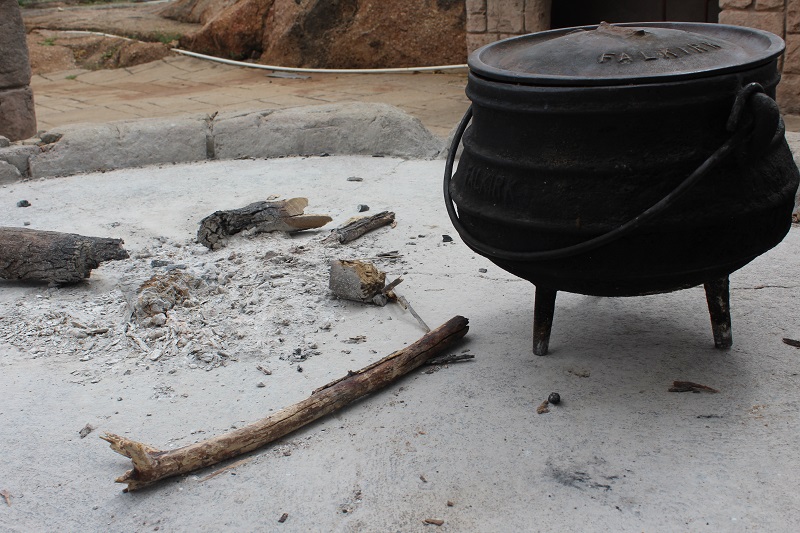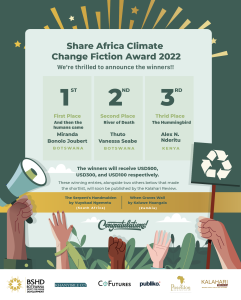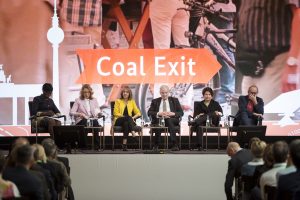Rural development is centred on natural resources and agriculture. The effects of climate change on the ecosystem have since worsened the plight of the rural poor, as natural resources and agriculture as the main sources of sustenance are under threat.
Renewable energy projects
Most affected are women and girls whose gendered chores dictate to them to walk great lengths to fetch water as nearby rivers have dried up, and to gather firewood for cooking and lighting. According to the Case Study of Botswana on Gender and Climate Change published by Edwin Pool in October 2016, firewood is an energy resource which is no longer near homesteads because of climate change driven desertification.
When carrying out these strenuous daily tasks, Pool’s findings purport that women and girls risk being raped by men, and being attacked by wild animals. In order to lessen the burden carried by women and girls, organisations such as Now for Them Community Trust have implemented programs like Marang a Thuto, aimed at increasing access to energy in rural Botswana, despite the financial challenges faced by this effort to aid climate change adaptation and mitigation.
“We donated 325 solar lamps in 2017. Villages that have benefitted from our efforts from 2016 to date are Mabalane, Sojwe, and Shadishadi to cite a few,” said Sarah Mulwa, Founder and President of Now for Them Community Trust.
Her project donates solar lamps to rural scholars whose households are not connected to the national electricity grid. Following the donation, the trust carried out research which revealed that students in rural communities no longer perform poorly as compared to those in towns and cities, as household roles and poverty no longer restricted studying to only during the day.
“To be able to donate lamps we run a yearly campaign called 100km Makgadikgadi Pans Walk for Solar Lamps for Rural Scholars in Botswana, which raises funds across the world to purchase solar lamps. This campaign began in 2017,” she said.
The donated solar lamps have also positively impacted the lives of women; who feel secure not living in the dark, and children living with disabilities. An initiative such as this striving to promote the use of renewable energy could achieve a lot with financial support from the government as the main socio-economic development driver, but the project has had no such luck. So on August 24, 2018, Sarah Mulwa and colleagues embarked on yet another 100km fundraising walk, with the hope to raise enough funds to purchase and subsequently donate 1000 lamps.
Coal production plans
While citizenry are advocating for solar energy, the government is planning on investing funds in increasing Botswana’s coal plants from seven to twenty-seven, and ramping up Morupule Coal Mine’s annual production to 8-million metric tons by 2025 from 2.8-million tons. All with the desire to ensure that Botswana produces enough electricity to meet its domestic consumption and hopefully export the surplus – strategically harmonising its balance of trade by reducing the import bill. These plans have since brought Botswana’s commitment to the Paris Agreement under scrutiny. With some questioning Botswana‘s ability to play a credible leading role in addressing climate change and sustainable development.
“We wish to see the government moving towards energy security which promotes the use of renewable energy especially solar, and biogas as we have enough waste to generate heat and electricity,” said Mulwa. Nevertheless, with the high costs that come with transitioning to solar, she comprehends the government’s predicament. “It is our government’s responsibility to provide affordable and sufficient energy to our people so cutting subsidies will negatively affect the less privileged and stifle our efforts towards poverty reduction. The challenge with solar is the high cost of storage, which technology is making strides to improve, however we can employ an energy mix that allows us to use solar during the day while the sun shines and use coal at night, until we phase put coal,” she said.
Tshepo Tsito, Founder of the Kalahari Culture & Nature Safaris who was born and raised in Palapye, a small town where the Morupule Coal Mine is located, also sees the need for a smooth transition to renewable energy given the positives and negatives emanating from coal production. “Morupule provides employment for my community and its surrounding areas, it boosts buying power of small local businesses and contributes to the existence of add on services such as transport,” he shared. On the one hand, however, he said the mine has resulted in persistent air pollution, it has taken land reserved for agriculture from locals, and has contributed to common social ills such as alcohol and substance abuse among the youth. Hence he urged the government to invest in ozone layer friendly technologies.
Climate financing
In an effort to diversify Botswana’s energy mix, and create an enabling environment for the exploitation of renewable energy, the government of Botswana says it has made significant strides in the development of the climate change policy, national climate change strategy and action plan, integrated waste management policy, and the energy policy development led by the Ministry of Resources, Green Technology and Energy Security. For Botswana to fulfil its commitments under and beyond the Paris Agreement, and achieve its Nationally Determined Contributions (NDCs) which outline efforts to achieve overall emissions reduction of 15 percent by 2030, Botswana says it will require financial support, it envisions, more than it is currently investing into coal.
“The plan is to get USD100 billion from the green climate fund. The money will fund three renewable energy projects we have in mind. We believe we would have done a lot in the development of these renewable energy projects by 2045. So in 2045, we will cap our use of coal,” said Thabang Botshoma, Deputy Permanent Secretary, Ministry of Environment, Natural Resources and Conservation and Tourism. Adding that, there is also need for coordinated efforts in innovative domestic resource mobilisation.
With the money, Botshoma said the government will be able to fund the transition. “We want to build a 100 megawatts solar power plant in Jwaneng. We are also trying to get funds to build a 200 mega-watts solar power plant. The off grid plant will cater for rural communities,” he explained.
Sharing his sentiments, Katrin Hagemann, Head of Political Affairs, Delegation of the European Union to Botswana and SADC, said it is unrealistic for Botswana to suddenly stop the use of coal. Moreover she said that solar in Botswana has a big future. “Botswana’s population is small, which makes its use of coal a non-issue. The problem comes with the need to export huge coal reserves, this becomes a climate change issue, as it means pollution. Because of this we will continue to advocate for solar. So far the country has some promising solar projects,” said Hagemann.
Effects of climate change
In the last decade climate change has led to about USD2.5 trillion in disaster losses in developing countries. The number of people affected by natural disasters doubled from 102 million in 2015 to 204 in 2016. About one third of the land, Botshoma said, is no longer fertile enough to grow food. More than 1.3 billion people live on this deteriorating agricultural land, putting them at risk of climate driven water shortages and depleted harvests. Since 2001, droughts have wiped out enough produce to feed 81 million people every day for a year. Between 2014 and 2016, the Southern African region suffered the worst drought in 35 years, which left an estimated 41.4 million of the population in need of food aid.
“Botswana has not been spared, with an estimated 500, 000 livestock deaths, and over 30, 000 people left vulnerable to the impacts of the drought,” said Thabang Botshoma.
As the devastating impacts of climate change continue to weigh heavily on vulnerable communities, it becomes rather evident that the government of Botswana should consider channelling more funds into large renewable energy projects, and small scale citizen efforts such as Marang a Thuto – all in an effort to mitigate swiftly.
-END-





